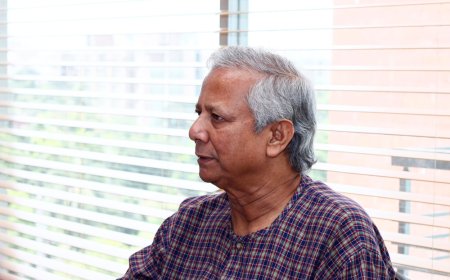Can Bangladesh Build a Truly Liberal Democratic Party?
We stand today at a critical juncture. The authoritarian state has collapsed, but the authoritarian mind endures. The struggle for democracy, therefore, is no longer against a regime -- it is against ourselves.

Every society gives birth to the kind of politics it deserves. Political parties are not created in a vacuum; they mirror the social values, moral codes, and power structures that surround them.
Bangladesh is no exception. The roots of its authoritarian politics run far deeper than the ruling regimes or military juntas of the past five decades.
They lie in our homes, our schools, our mosques, and our offices -- in the everyday practices that have made hierarchy, conformity, and blind loyalty appear as virtues, dissent, dialogue, and accountability as threats.
Today, as a new generation dares to imagine a liberal democratic alternative -- one that promises transparency, constitutionalism, and respect for rights -- it confronts not only political adversaries but the weight of a culture that has long internalized illiberalism.
Building a new democratic party in Bangladesh, therefore, is not simply a matter of writing a manifesto. It is a civilizational challenge -- the struggle to reimagine our moral and political selves.
The first obstacle to democratic renewal is the absence of exposure to democratic principles at the grassroots. Leadership in most parts of Bangladesh grows not through civic education or participatory training, but through loyalty networks, patronage, and personal charisma.
Village politics, student politics, and even local civil society are shaped by personalism -- not pluralism.
When decision-making is arbitrary and unquestioned within the family or community, how can one expect a new party to operate through debate, compromise, or rule-bound procedure?
In truth, democracy cannot flourish where accountability is alien to daily life. In many households, the father remains the unquestionable authority; in schools, obedience is rewarded more than curiosity; in workplaces, deference replaces initiative.
A democratic party cannot thrive in a society that equates disagreement with disloyalty. Yet Bangladesh’s public sphere -- both physical and digital -- is increasingly defined by mob outrage and moral absolutism.
Our intolerance is not only political; it is social and psychological. We have learned to cancel, condemn, and coerce long before we learn to converse.
The rise of “mob culture” -- from campus violence to social media witch-hunts -- reflects an absence of civic ethics. It also exposes how weak our moral imagination has become.
True democracy demands that we see others not as enemies but as co-participants in a shared experiment of justice. But when power is understood as domination rather than persuasion, tolerance becomes a casualty.
A liberal democratic party is, above all, an institution -- not a movement of personalities. Yet in Bangladesh, the very idea of institutionalization remains poorly understood.
Many emerging leaders neither know what party institutionalization entails nor possess the humility to learn. Institutions require rules, continuity, and collective discipline -- qualities that sit uneasily with the ego-driven culture of politics.
As a result, even well-intentioned movements often disintegrate into factionalism or charismatic control. The absence of stable internal mechanisms -- from transparent membership systems to democratic candidate selection -- ensures that personality triumphs over principle.
Without institutionalization, a party cannot outlive its founders; without rules, it cannot resist corruption; without collective deliberation, it cannot claim to be democratic.
If there is one disease that corrodes every attempt at building new politics, it is distrust. In Bangladesh, betrayal has become a political habit -- born of decades of opportunism, defection, and manipulation. Leaders rarely trust one another; alliances are fragile; loyalty is constantly questioned.
Most leaders rely on subjective intuition and personal judgment -- creating small echo chambers that reinforce paranoia and stifle diversity.
Trust, in this sense, is not built through emotion but through process -- through predictable, rule-bound systems that make betrayal costly and cooperation rewarding.
Perhaps the gravest challenge to liberal democratic politics is the cultural disregard for process itself. In a society accustomed to shortcuts, rules are seen as obstacles rather than safeguards.
Leaders are often consumed by the fear of sabotage -- a fear that makes them more authoritarian than their rivals.
The antidote to sabotage, however, is not control but transparency. Only a clear, open, and rule-bound process can shield an organization from intrigue. But this requires both wisdom and patience -- two virtues often absent in a political culture obsessed with immediate power. The result is predictable: Without process, there is no trust; without trust, there is no democracy.
The most haunting question, however, remains this: Even if a new liberal democratic party emerges, will it not become a replica of the old?
Political parties are, after all, mirrors of their societies. Can a society still trapped in patron-client relations, pseudo-feudal loyalties, and patriarchal hierarchies truly produce democratic institutions?
Patronage has long been the moral economy of our politics. Personal loyalty replaces institutional obligation; favours substitute for rights.
The same feudal logic that once governed rural estates now governs political networks and even social media activism.
Unless we confront this cultural inheritance, no amount of constitutional rhetoric will make us liberal.
A society that does not practice accountability in the family cannot sustain it in the parliament. A culture that fears dissent at the dinner table will not tolerate opposition in the cabinet.
Our authoritarianism, in short, begins at home -- and democracy must, therefore, begin there too.
The project of building a liberal democratic party in Bangladesh is thus both urgent and perilous. It demands not only institutional reforms but a moral revolution -- a new political pedagogy that teaches citizens to question power, respect procedure, and value pluralism.
Such a transformation cannot be imported from abroad or imposed from above. It must be cultivated through deliberate civic education, dialogue, and modeling of democratic behaviour within the party itself.
Internal elections, transparent funding, deliberative policy-making, and ethical leadership training are not optional ideals; they are the very foundations of credibility.
The danger, of course, is that the new may eventually imitate the old -- adopting the very authoritarian methods it once denounced.
To resist that fate, the leaders of the new generation must treat democracy not as a slogan but as a discipline: a discipline of listening, reasoning, compromising, and holding oneself accountable.
Bangladesh stands today at a critical juncture. The authoritarian state has collapsed, but the authoritarian mind endures.
The struggle for democracy, therefore, is no longer against a regime -- it is against ourselves.
A truly liberal democratic party will emerge only when our politics ceases to be an instrument of domination and becomes an expression of shared moral purpose.
That journey begins not with slogans, but with self-reform. Until we democratize our hearts, our homes, and our habits, no constitution or charter will save our republic.
What's Your Reaction?















































































